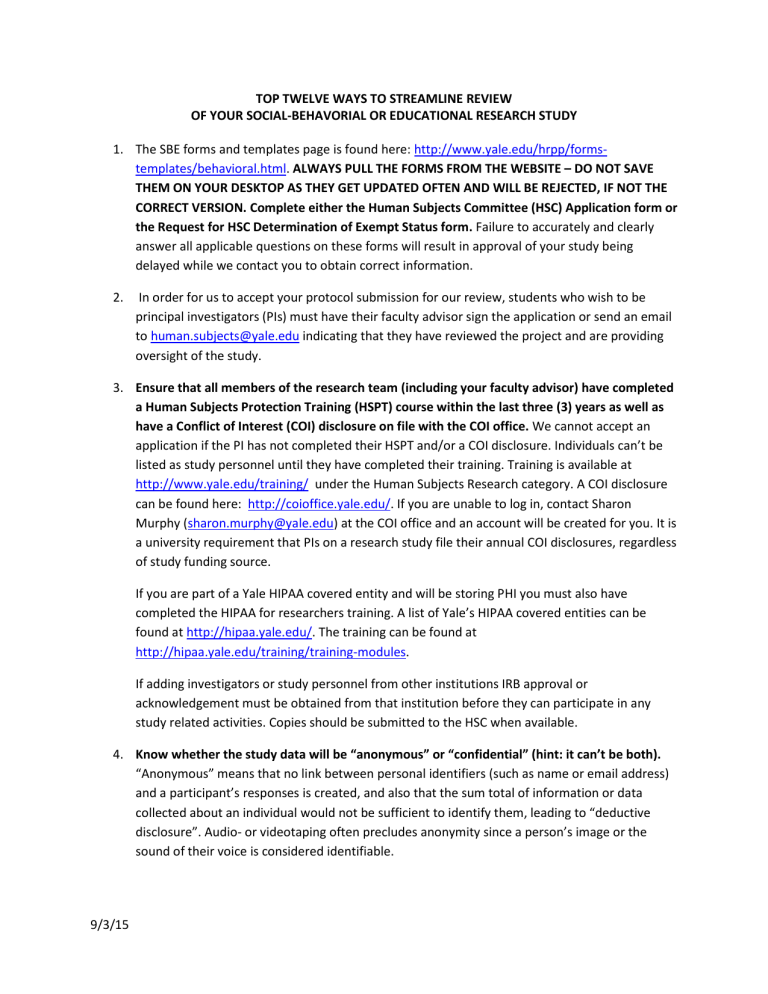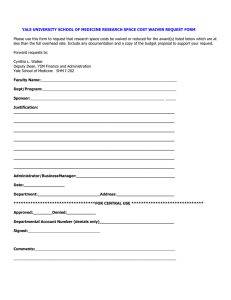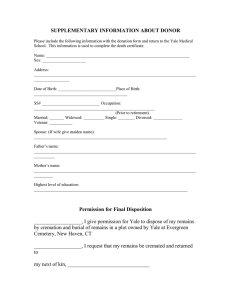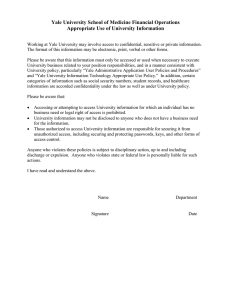Top Twelve Ways to Streamline Review

TOP TWELVE WAYS TO STREAMLINE REVIEW
OF YOUR SOCIAL-BEHAVORIAL OR EDUCATIONAL RESEARCH STUDY
1.
The SBE forms and templates page is found here: http://www.yale.edu/hrpp/formstemplates/behavioral.html
. ALWAYS PULL THE FORMS FROM THE WEBSITE – DO NOT SAVE
THEM ON YOUR DESKTOP AS THEY GET UPDATED OFTEN AND WILL BE REJECTED, IF NOT THE
CORRECT VERSION. Complete either the Human Subjects Committee (HSC) Application form or
the Request for HSC Determination of Exempt Status form. Failure to accurately and clearly answer all applicable questions on these forms will result in approval of your study being delayed while we contact you to obtain correct information.
2.
In order for us to accept your protocol submission for our review, students who wish to be principal investigators (PIs) must have their faculty advisor sign the application or send an email to human.subjects@yale.edu
indicating that they have reviewed the project and are providing oversight of the study.
3.
Ensure that all members of the research team (including your faculty advisor) have completed a Human Subjects Protection Training (HSPT) course within the last three (3) years as well as
have a Conflict of Interest (COI) disclosure on file with the COI office. We cannot accept an application if the PI has not completed their HSPT and/or a COI disclosure. Individuals can’t be listed as study personnel until they have completed their training. Training is available at http://www.yale.edu/training/ under the Human Subjects Research category. A COI disclosure can be found here: http://coioffice.yale.edu/ . If you are unable to log in, contact Sharon
Murphy ( sharon.murphy@yale.edu
) at the COI office and an account will be created for you. It is a university requirement that PIs on a research study file their annual COI disclosures, regardless of study funding source.
If you are part of a Yale HIPAA covered entity and will be storing PHI you must also have completed the HIPAA for researchers training. A list of Yale’s HIPAA covered entities can be found at http://hipaa.yale.edu/ . The training can be found at http://hipaa.yale.edu/training/training-modules .
If adding investigators or study personnel from other institutions IRB approval or acknowledgement must be obtained from that institution before they can participate in any study related activities. Copies should be submitted to the HSC when available.
4.
Know whether the study data will be “anonymous” or “confidential” (hint: it can’t be both).
“Anonymous” means that no link between personal identifiers (such as name or email address) and a participant’s responses is created, and also that the sum total of information or data collected about an individual would not be sufficient to identify them, leading to “deductive disclosure”. Audio- or videotaping often precludes anonymity since a person’s image or the sound of their voice is considered identifiable.
9/3/15
In contrast, “confidential” means the information or data is not anonymous (i.e. coded, or outright identifiable), but steps will be taken to ensure that data is protected from disclosure.
Confidential data often involves use of a “key” that links an individual’s personal identifiers with a study ID number or pseudonym. The key is stored in a separate location from responses which are labeled with only the study ID number or pseudonym. This way, access to both the responses and the key are needed to know who said what, thus minimizing the risk of disclosure. Other tools for maintaining confidentiality include the encryption of stored data and tapes and a careful selection of the location and methodology for data collection. See item 5 for further considerations.
5.
Tell us how you will keep the data secure. Data security measures will vary depending on the nature, sensitivity and circumstances of the study. In all cases, please describe your plans in the study protocol. Some considerations in developing your data security plan include:
COMPUTER STORAGE: Will data be secured using computer password protection or encryption
(PGP is recommended and available to Yale staff through http://its.yale.edu/securecomputing/protecting-yales-data/data-encryption ). Note that password protection alone provides only minimal protection of the data as passwords are easily circumvented. See also http://its.yale.edu/secure-computing .
KEY: Will you use a key to link separate identifiable information and responses? In some cases, a linking key may be needed transiently such as for the collection of data at multiple time points, after which the key can be destroyed rendering the data anonymous. Be sure to also consider if there is a possibility for deductive disclosure, such as when the data is so descriptive about a person that it remains identifiable even after the link to direct identifiers is destroyed.
TAPING: Will study notes be handwritten, typed or audiotaped? How will any tapes be treated – if the data being collected is sensitive, the tapes should be encrypted until transcription and then securely stored or deleted If handwritten and identifiable how will they be kept safe during transport and before transcribing?
ADDITIONAL CONSIDERATIONS: Sometimes the location in which data is collected can either enhance or compromise data security. Investigators working in remote areas may have unique challenges that require creative data security solutions. In all cases, the consent materials should accurately reflect the research plans to keep the data confidential, as well as any future plans to anonymize or destroy the data, if applicable. The moat encouraged way to transfer sensitive data is through Yale secure transfer.
6.
Be certain your consent document or verbal consent contains the required elements (these
can be presented in your own format). The HSC consent templates provided on our Forms page http://www.yale.edu/hrpp/forms-templates/behavioral.html
include all required elements (per federal regulations at 45 CFR 46.116 and Yale University policy) and indicate areas to be tailored to the specifics of your study. A verbal consent form template is also available for you to use. Be sure to tailor it to your study and delete things that are not applicable and answer the guidance
9/3/15
that is. Be certain that all recruitment and consent information accurately reflects the study
plans and uses language understandable to potential participants.
7.
Ensure that your protocol procedures and other information match your consent form. Be sure to reread and edit your documents before submitting them. For example, make sure if your protocol states the study takes 5 hours that the consent form doesn’t say 6 or be sure the payments given to participants are consistent between documents. This will prevent unnecessary revisions being requested and result in a quicker approval time.
8.
Clarify whether you speak the local language or will require a translator. If a translator is needed, from where will the translator be identified and what is their training? A Confidentiality
Pledge Agreement found on the SBE forms and templates page may be appropriate for interviews with sensitive topics. This agreement is not needed for Yale New Haven Hospital translators.
9.
Provide documentation of local review (ALL international studies) and/or documentation from
a local advisor (student studies). Ideally, all studies should be reviewed by a local IRB or ethics board. However, many international studies do not have a local IRB or ethics board that can provide review and study oversight. To see if the country or city or institution you are going to has an IRB see http://ohrp.cit.nih.gov/search/search.aspx?styp=bsc or https://healthresearchweb.org/en/result . OHRP has also compiled an extensive list of international oversight bodies, regulations and guidance; be sure to check the 2013 Edition of the International Compilation of Human Research Standards: http://www.hhs.gov/ohrp/international/intlcompilation/intlcomp2013.pdf.pdf
In cases where other oversight is lacking, we rely on local organizations, leaders, academicians or other entities informed and able to speak on behalf of the cultural issues related to the population being studied in lieu of local IRB review. The documentation needed for the HSC will be a statement that the local organization or leader is familiar with the study and believes that the study is both appropriate from a local perspective and has a favorable risk-to-benefit ratio.
A local advisor is often needed for students working in international settings to ensure that someone locally will be providing guidance during the student’s time at the international site.
The role of the local advisor may include cultural or logistical guidance or introductions to other local groups. Review the information on international research on the HRPP website: http://www.yale.edu/hrpp/international/index.html
for more information.
10.
Special considerations for focus groups: The consent process often needs a clear statement that others in the group might disclose what is shared during the group discussion even if the study personnel plan to keep responses confidential or record the information without any identifiers.
Be sure to add taping as a procedure in the consent materials if it is to be used, as well as information on confidentiality of the tapes.
11.
Special considerations for “secondary use” data studies. A study is considered to involve secondary use data if it uses data that was collected or will be collected for either research
9/3/15
purposes or non-research purposes. Some secondary use data is publicly available (on the internet, in libraries, in media sources. An example is the Census: http://www.census.gov/main/www/access.html) whereas other data sources are considered restricted access. If your data source requires approval from the data holder or requires that you sign an agreement to obtain access, it is very likely considered restricted access data and will not qualify for HSC exemption.
For secondary use studies, be sure to tell us any personal identifiers (name, IP number, GPS, street address, etc, see full list at http://hipaa.yale.edu/policies/forms/Form5039-
DiIdentificationChecklist.pdf
) that you will receive with the data, whether the data is potentially identifiable from the bulk of the data (even when personal identifiers are not received from the data holder), the conditions for the initial data collection such as research consent or data culled from records without consent, and how you plan to keep the data secure. Include details on what data will be transferred to you such as whether the individualized data or only summary or aggregate data will be stored at Yale. Some data holders have their own requirements for confidential storage of the data; please share this with us and be sure you follow their recommendations. It is recommended that investigators obtain documentation of approval from the data holder.
12.
Offer contact information for the study to participants. Participants are often offered either a copy of the consent form (either verbal or written), a business card or a tear-off sheet to provide study contact information if they have questions or concerns about the study. Contact information should be offered to all participants except in rare cases where consent is waived altogether. Contact information should be offered regardless of whether activities were conducted in person or online, or whether written, verbal or online consent was obtained.
Include your own contact information, the current contact information for the HSC* and/or a local contact when working internationally. Contact information must include country code, area code and number in cases where participants will be calling a country other than their own.
Participants must be provided with a contact in addition to the contact information for research study personnel. Generally, this would be the HSC, however, when working with populations who may have difficulty reaching us here in the US or who would have language barriers, we recommend asking your local affiliated organization to accept these queries and then report the questions to the HSC.
*Be sure you are including the current HSC contact information if participants would have a means to contact the United States: “If you would like to talk with someone other than the researchers to discuss problems or concerns, to discuss situations in the event that a member of the research team is not available, or to discuss your rights as a research participant, you may contact the Yale University Human Subjects Committee, (tel) -1-203-785-4688, human.subjects@yale.edu
. Additional information is available at http://www.yale.edu/hrpp/participants/index.html
”
9/3/15
9/3/15
COMPLETED SUBMISSIONS AND THEIR SUPPORTING DOCUMENTS ARE THEN SENT
ELECTRONICALLY TO human.subjects@yale.edu
PLEASE NOTE IF YOU ARE APPLYING FOR A FELLOWSHIP OR HAVE RECEIVED A FELLOWSHIP TO
CONDUCT RESEARCH USE THE FOLLOWING EMAIL ADDRESS TO SEND IN YOUR HSC
APPLICATION: fellowships.HSC@yale.edu
QUESTIONS CAN BE DIRECTED TO THE YALE HUMAN SUBJECTS COMMITTEE AT human.subjects@yale.edu
, 203-785-4688 OR TO ONE OF OUR REGULATORY ANALYSTS:
Brandy Lagner brandy.lagner@yale.edu
203-737-4219
Carrie McDaniel carrie.mcdaniel@yale.edu
203-737-4744
Cheryl Danton cheryl.danton@yale.edu
203-785-6438



